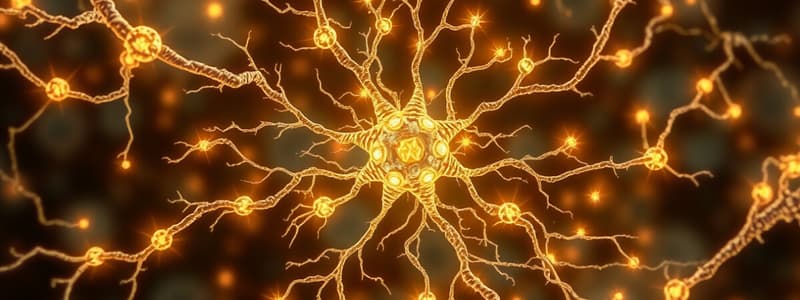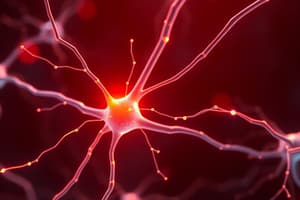Podcast
Questions and Answers
What is the primary action of local anesthetics on nerve cells?
What is the primary action of local anesthetics on nerve cells?
- Increasing awareness and sensory perception
- Stimulating neurotransmitter release
- Promoting the regeneration of nerve cells
- Binding to sodium channels to inhibit nerve transmission (correct)
Which neurotransmitter is NOT listed among the common neurotransmitters in the brain and spinal cord?
Which neurotransmitter is NOT listed among the common neurotransmitters in the brain and spinal cord?
- Dopamine
- Acetylcholine
- Glutamate (correct)
- Serotonin
What condition can result from excessive nerve impulses?
What condition can result from excessive nerve impulses?
- Peripheral neuropathy
- Multiple sclerosis
- Fibromyalgia
- Neuralgia (correct)
Where does the herpes simplex virus lie dormant before reactivation?
Where does the herpes simplex virus lie dormant before reactivation?
Which effect is NOT associated with the use of local anesthetics?
Which effect is NOT associated with the use of local anesthetics?
What is the term for a nerve impulse that runs towards the brain and central nervous system?
What is the term for a nerve impulse that runs towards the brain and central nervous system?
What initiates a nerve impulse?
What initiates a nerve impulse?
Which structure stores neurotransmitters prior to their release?
Which structure stores neurotransmitters prior to their release?
What occurs at the synapse?
What occurs at the synapse?
How is the action of a neurotransmitter typically characterized?
How is the action of a neurotransmitter typically characterized?
What process releases neurotransmitters into the synaptic cleft?
What process releases neurotransmitters into the synaptic cleft?
What happens to neurotransmitters after they act on the receptor sites?
What happens to neurotransmitters after they act on the receptor sites?
What describes the journey of a neurotransmitter from synthesis to action?
What describes the journey of a neurotransmitter from synthesis to action?
Flashcards are hidden until you start studying
Study Notes
Nerve Impulses
- Nerve impulses are initiated by either sensory nerve ending stimulation or the passage of impulses from another nerve.
- Afferent (sensory) impulses travel towards the brain and central nervous system (CNS).
- Efferent (motor) impulses travel away from the brain and CNS.
- Synapses are the points where nerve impulses jump from one nerve to another.
- There are approximately 1000 trillion synapses in the brain.
- Synaptic knobs contain spherical, membrane-bound synaptic vesicles that store neurotransmitters.
Neurotransmitters
- Neurotransmitters are chemicals released into the synaptic cleft.
- The journey of a neurotransmitter:
- Synthesized by nerve cell bodies.
- Actively transported along axons.
- Stored in synaptic vesicles.
- Released by exocytosis in response to action potential.
- Diffuse across the synaptic cleft.
- Act on specific receptor sites on the postsynaptic membrane.
- Short-lived action.
- Inactivated by enzymes or taken back into the synaptic knob.
- More than 50 neurotransmitters exist in the brain and spinal cord.
- Some examples include:
- Noradrenaline
- Adrenaline
- Dopamine
- Histamine
- Serotonin
- Acetylcholine
- Some examples include:
Drugs & Nerve Impulses
- Drugs can increase the excitability of neurons or inhibit neurotransmitters.
Local Anaesthetics
- Local anaesthetics block nerve transmission to pain centres in the CNS by binding to and inhibiting the function of sodium channels in the cell membrane of nerve cells.
- This action obstructs the movement of nerve impulses near the site of injection.
Neuralgia
- Excessive nerve impulses can lead to neuralgia, with trigeminal neuralgia being the most common.
Herpes Simplex Virus
- The herpes simplex virus (HSV) lies dormant in the trigeminal ganglion.
- When reactivated, HSV travels down the trigeminal nerve, emerging on the lip and potentially causing a cold sore.
Studying That Suits You
Use AI to generate personalized quizzes and flashcards to suit your learning preferences.




